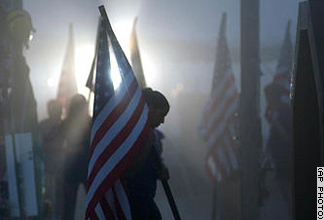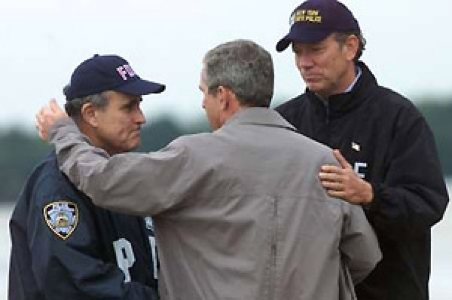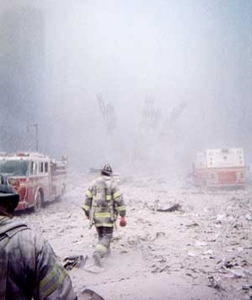From the dawn memorial service for Flight 93 in Shanksville, PA:

by Bryan Strawser ·
From the dawn memorial service for Flight 93 in Shanksville, PA:

by Bryan Strawser ·
September 11th has impacted me significantly personally, politically, and professionally. Certainly its impacted me more than I expected it to when I sat that morning in front of a television and watched the world suddenly shift about me —
Personally, 9/11 was a gut-wrenching emotional experience for me. I was driving in Connecticut on my way to visit a store that morning when a peer called to tell me about what had happened. The second plane had just hit, you see. I spent that morning in South Windsor, Connecticut with my team watching as the day unfolded. I remember, that morning, being almost completely in shock.
The emotions came to me on the ride home – alone – listening to the radio. And then more that night on the couch, watching the news until 2 or 3 in the morning.
There are a few memories and images from that time that have always stayed with me —
When I recovered from my shock that morning – it was the realization that hundreds of police, fire, and EMS personnel had gone into those buildings – risked their lives – and as we discovered later that day – many had given their lives to save others.
The second is what happened to me the next morning at work. I was in the my office around 6:30am to meet someone for a long drive and spend the day visiting stores together.
Shortly after I arrived at the office, I heard a loud roar overhead.
“Oh, just an airplane flying by…”, I thought.
Then it hit me – nothing was supposed to be flying. I ran outside and looked up.
It was a flight of Air Force fighters in a formation of five – flying out towards Cape Cod to take up a Combat Air Patrol. Something I’d never seen before outside of an airshow…
Emotionally, 9/11 affected me – like others – greatly. I was fortunate in that I did not lose any friends or family members that day. But I cried many times during the following days – sometimes out of a sense of loss – sometimes in awe of the heroism displayed that morning – sometimes just because I love my country.
I would tear up just driving down the road in the weeks following 9/11 when I would see an American Flag hanging over an overpass – or when I’d hear a sound bite on the radio of Mayor Giuliani, President Bush, or others speaking about 9/11. And, to this day, the video of the Star Spangled Banner being played at Buckingham Palace in London reduces me to a blathering idiot.
Professionally, 9/11 has had a huge impact on how my job is viewed – and what I worry about each day. I’ll always focus on the traditional aspects of retail loss prevention – theft and fraud – but now I’m highly concerned with how we prepare and posture ourselves to better respond to a crisis – how we prevent major incidents – how we coordinate with public safety officials – and on and on —
What I worry about today at work is night and day from what I worried about when I started in this field eleven years ago…
Two photos from that time have always stuck with me..
The first is the widely publicized photograph of President Bush comforting Mayor Giuliani and Governor Pataki during his visit to New York City a few days after 9/11.

The second is a photo (and story) that I first saw months after 9/11 in Dennis Smith’s book Report from Ground Zero.
It’s a photo of Lt. Ray Murphy of the New York City Fire Department (FDNY). He was walking away from the cameraman following the collapse of the first WTC Tower. He had just recovered from that tower collapse and was headed into the still standing WTC tower in order to help others.

This picture has always reminded me of both heroism and sacrifice given freely by the men and women of the FDNY, NYPD, PAPD, and others that day —
In the end, I think we all have the responsibility to remember what happened that day – to us – to our fellow man – here in our own country.
A few weeks ago, while having coffee with a peer in Minneapolis, our conversation steered towards the impact of September 11th on our lives – both personally and professionally.
She pulled out her PDA – tapped on it a few times – and spun it around so that I could read it.
It was her calendar – turned to September 11th, 2004 – and it showed just one word:
Remember
by Bryan Strawser ·
Winds of Change this morning is pointing to the Eulogy of Captain Francis J. Callahan of the FDNY, over at Philip Toshio Sudo:
Eulogy of Capt. Francis J. Callahan, delivered by Capt. James Gormley, Dec. 10, 2001:
Captains and lieutenants of the New York City Fire Department share a special relationship with other officers of similar rank. When we meet for the first time we introduce ourselves to each other, we shake hands, we measure each other’s resolve and fortitude. At Operations our aggressiveness is based on the trust we share in each other.
Firefighters and their officers share a different, but also special relationship. Officers very literally lead firefighters into harm’s way. We go first. If things go badly we are required by our oath and tradition to be the last of our command to leave. Accountability for our men is carved into our heart. Responsibility for our men, their wives and children are in the depth of our soul.
This is why we are here today. Capt. Frank Callahan is the ranking officer killed at the World Trade Center from our firehouse. He leaves last. I cannot say he will be the last to ever leave. We live in a dangerous world, and we put our boots and helmets on every day.
Captains, especially commanding officers of companies in the same quarters, have a unique relationship. We know each other as no else ever will. We are commanding officers of complementary companies. We cannot work successfully without each other. There are not many of us, you could fit us in one fair-sized room. We are not always friends. There is too much at stake, but our respect, and trust in each other, is unquestioned.
Frank Callahan was more than my friend, to simply call him brother would not do our relationship justice. Frank was my comrade. It’s harder to be a comrade than a friend. It’s different than being a brother.
Friends and brothers forgive your mistakes. They are happy to be with you. You can relax and joke with them. You can take your ease with them–tell them tall tales.
Comrades are different. Comrades forgive nothing. They can’t. They need you to be better. They keep you sharp. They take your words literally.
When a friend dies we miss them, we regret words unspoken, we remember the love. When a brother dies we grieve for the future without him. His endless possibilities. If your brother doesn’t die of old age you might never accept the parting. When a comrade dies we miss them, we regret words unspoken, we remember the love, we grieve the future without them. We are also proud. Proud to have known a good man, a better man than ourselves. We respect the need for him to leave, to rest.
Some people equate camaraderie with being jovial. It is anything but. Camaraderie is sharing hardship. It is shouts and commands, bruises and cuts. It’s a sore back and lungs that burn from exertion. It’s heat on your neck and a pit in your stomach. It’s a grimy handshake and a hug on wet shoulders when we’re safe. It’s not being asleep when it’s your turn on watch. It is trust, it is respect, it is acting honorably.
You hold your comrade up when he can’t stand on his own. You breathe for him when his body’s forgotten how. It’s lifting a man up who loves his wife and children as much as you love your own. Looking them in the eye for the rest of your life and trying to explain, and not being able to. You kiss them for him. It’s laying him down gently when his name appears on God’s roll call. It’s remembering his name. I’ll never forget his name. He was just what he was called: Frank. You never had to chase your answer. He said it to your face.
It’s at the same time being both amazed and proud that you’ve known men like him. Looking for your reflection in their image. Seeing it. Knowing you’re one of them.
There’s a song out of Ireland. A line of it says, “Comrade tread lightly, you’re near to a hero’s grave.” If you ever said that to Frank he would have given you the “look” and pushed past you in the hallway.
Frank was light on his feet but he never tread anywhere lightly. When Frank did something it was like a sharp axe biting into soft fresh pine, with a strong sure stroke. It was done. It was right. It meant something. It was refreshing. It smelled good.
Quite often we discussed history. The successes and failures of political, military and social leadership. The depth and broadness of Frank’s historical knowledge was astounding.
I’ve been told Frank enjoyed a practical joke. We never joked together. Rarely laughed. We never sought out each other’s company on days off. We never went golfing or fishing. We never went for a hike in the Shawangunk Mountains together. We were often happier apart than we ever were together because we shared the nightmares of command.
We shared problems. We shared stress. We shared dark thoughts that are now front-page news. Incredulous at the failures of leadership that have borne fruit. We shared the proposition of a time and place where few would dare to go. He went there because it was his turn. He called his wife, Angie, before he received his orders to respond. He told her what was going on. He told her things didn’t look good; he told her he loved her.
Historically it is said, “They rode to the sound of the guns”:
Capt. Frank Callahan
Lt. John Ginley
Firefighter 1 Gr. Bruce Gary
Firefighter 1 Gr. James Giberson
Firefighter 1 Gr. Michael Otten
Firefighter 1 Gr. Kevin Bracken
Firefighter 1 Gr. Steve Mercado
Firefighter 1 Gr. Michael Roberts
Firefighter 1 Gr. John Marshall
Firefighter 3 Gr. Vincent Morello
Firefighter 3 Gr. Michael Lynch
Firefighter 6 Gr. Michael D’Auria
and Firefighter 2 Gr. Kevin Shea
Kevin, we are joyful that we got you back. Have no guilt. The same goes for the rest of us. I know what you all did, you got your gear on, found a tool, wrote your name or Social Security number in felt tip pen on your arm or a leg, a crisis tattoo in case you got found.
We went down there knowing things could go badly. We stayed until we were exhausted, got three hours sleep and went back again, and again. That’s what comrades do. Only luck and circumstance separate us from them.
It is significant that we are in Lincoln Center for the Performing Arts. The first performance here was “West Side Story,” the story of this neighborhood. This Act is part of that story. It is more than we can absorb in one lifetime, so the story must be told until it makes sense.
It is poignant because the arts have helped mankind deal with reality since stories were told round the fire and we drew on cave walls. The arts help us exercise our emotions. We are surrounded by art and overwhelmed by our emotions. From the pictures children have drawn for us, the poetry, songs, and banners, to the concerts, plays and operas that we have been invited to attend–use the arts to heal your heart. Exercise your emotions. Feel anger, feel hate, feel love and pride. Run the gamut of your emotions until you settle where you belong, as good honorable men, every inch the equal of our comrades, friends and brothers. That’s what they want. That’s what your families need. That’s what you deserve.
Frank was a trusted leader, a captain. The best commander I’ve encountered here, or in the military. It was important to him. We both believed captain to be the most important rank in the department. He was forged by his family, his comrades, every officer and firefighter that he ever worked with. He was tempered by his experience.
History, the record of successes and failures of leadership, has caused us to be here. Capt. Frank Callahan did not fail in his leadership. He led his command where they were needed, and he’s the last of them to leave. If more of the world’s leaders were forged as he was, our world would not be in its current state.
Frank Callahan is a star, a reference point. A defined spot on the map of humanity. Guide on him to navigate the darkness. You will not wander, you will not become lost
by Bryan Strawser ·
Glenn Reynolds, over at Instapundit pointed to this Bleat, by Minneapolis’s James Lileks from September 11, 2003.
I’ve never read a more fitting blog post about 9/11:
Two years ago today I was convinced that every presumption I had about the future was wrong. This war, I feared, would be horrible, total, and long.
Two years later I take a certain grim comfort in some people’s disinterest in the war; if you’d told me two years ago that people would be piling on the President and bitching about slow progress in Iraq, I would have known in a second that the nation hadn’t suffered another attack. When the precise location of Madonna’s tongue is big news, you can bet the hospitals aren’t full of smallpox victims. Of course some people are impatient with those who still recall the shock of 9/11; the same people were crowding the message boards of internet sites on the afternoon of the attacks, eager to blame everyone but the hijackers. They hate this nation. In their hearts, they hate humanity. They would rather cheer the perfect devils than come to the aid of a compromised angel. They can talk for hours about how wrong it was to kill babies, busboys, businessmen, receptionists, janitors, fathers, mothers, sisters, brothers – and then they lean towards you, eyes wide, and they say the fatal word:
But.
And then you realize that the eulogy is just a preface. All that concern for the dead is nothing more than the knuckle-cracking of an organist who’s going to play an E minor chord until we all agree we had it coming.
I’ve no doubt that if Seattle or Boston or Manhattan goes up in a bright white flash there will be those who blame it all on Bush. We squandered the world’s good will. We threw away the opportunity to atone, and lashed out. Really? You want to see lashing out? Imagine Kabul and Mecca and Baghdad and Tehran on 9/14 crowned with mushroom clouds: that’s lashing out. Imagine the President in the National Cathedral castigating Islam instead of sitting next to an Imam who’s giving a homily. Mosques burned, oil fields occupied, smart bombs slamming into Syrian palaces. We could have gone full Roman on anyone we wanted, but we didn’t. And we won’t.
Which is why this war will be long.
The world will not end. It will roll around in its orbit until Sol expires of famine or indigestion. In the end we’re all ash anyway – but even as ash, we matter. The picture at the top of this page is a sliver taken from a 9/11 camera feed. It’s the cloud that rolled through lower Manhatttan when the towers fell. Paper, steel, furniture, plastic, people. The man who took the picture inhaled the dust of the dead. Somewhere lodged in the lung of a New Yorker is an atom that once belonged to a man who went to work two years ago and never came back. His widow dreads today, because people will be coming and calling, and she’ll have to insist that she’s okay. It’s hard but last year was harder. The kids will be sad and distant, but they take their cues from her, and they sense that it’s hard – but that last year was harder. But what really kills her, really really kills her, is knowing that the youngest one doesn’t remember daddy at all anymore. And she’s the one who has his eyes.
Two years in; the rest of our lives to go.